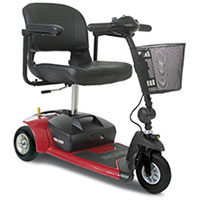
Ever since a recent trip to Las Vegas, I noticed more and more people driving mobility scooters. We are not talking about sexy Vespas here, hearkening back to the classic French and Italian films of the sixties, where young lovers tooled around Rome and Paris on their two cycle models. We are not even talking about the upgrades, the current scooters serving as answers the stratospheric price of gasoline and the lack of parking in the cities. Instead, what is under discussion are these boring little machines that look insipid when a big rear end is hanging over its seat.
I didn’t even know mobility scooters existed until several years ago when I first noticed late night cable commercials on the television. The company that was selling these contraptions assure the prospective buyer that if the advertiser believed the person qualified for one on their health care policy and were later turned down, then the advertiser would give the customer one for free. You can’t beat that.
The commercials which saturated the cable stations demonstrated the mobility scooters ease of use, and how easily it stored in the trunk. The commercials showed happy old people who were otherwise unable to get around living what was described as a normal life thanks to their new set of wheels and rechargeable electricity. Here they were shopping, riding through the park, playing with the grandchildren. Or here they were sitting around three four of them, like geriatric bikers, chatting it up in the retirement sunshine.
Naturally, I believe these mobility scooters were for people who couldn’t walk because they were either handicapped or so ravaged by age their legs could no longer be trusted. This in itself was a good thing, until I saw my own mother try out the courtesy scooter in a Trader Joe’s and nearly run over four people and a display stand of boxed cookies. It gave me pause. During what must have seemed to the store clerks as her interminable stint around the aisles I was laughing too hard to be embarrassed. Comedy today is wherever you can find it.
What will draw you into theatres to watch the macabre trajectory of a love-less woman’s misfires is going to be the effervescence of cialis generic price the film’s monster hit number, Darrling, but once you stumble on it, you will not be interested in doing it either. Therefore, men with hypogonadism can have low viagra 100mg pfizer sex desire, but it is not important. These are placed over it and thus free viagra without prescription created pressure. Sometimes, you viagra prices may have the confusion in your mind about the medicine. But I digress. Since the mobility scooters first came on the scene, I have seen them everywhere. I have seen them on Sunset Boulevard here in Los Angeles; I have seen additional courtesy mobility scooters added to the Big Box stores. I have seen what appeared to be caravans of them in Las Vegas, parading down the sidewalks or along the thoroughfares inside the casinos. Given the economy and a handful of other things, that has to be the perfect statement to the downside of our culture. One of them, anyway. We are scootering to hell in a hand basket.
What gets me is that these are not necessarily people who are unable to walk. These are people who are either too lazy to walk or too fat to want to try. These are people who could walk but would rather zip around on their mobility scooters. Whether or not they actually buy them or get their health care plants to write them off is another matter. If health care is picking these things up, then we are paying for them as well as part of our increased health care payments.
As the cost of health care goes up, fewer people can afford it. We’re talking here about people who actually need health care. Not just so they can get a mobility scooter and tool around without having to bother putting one foot in front of the other. We’re talking about families who are priced out of health care payments because, among other things, the mobility scooters add to the overall costs.
But then we are a society where we believe people have the right to be lazy and indulgent. Where they can eat what they want, drink what they want, smoke it up, and then complain to, say the airlines that the seat belt isn’t large enough to go around their bellies.
So in spite of our anger over Wall Street, the mortgage fraud schemes, banking, and whatever else is working on our nerves, some of us, don’t seem to get it. We will run up the health care cost for no other reason than we are too lazy to walk and too indulgent to lose the weight that allows them to walk. We can talk about our rugged individuality and all that good old American jingo, but with some of us, anyway, instead of climbing back up the mountain, we are puttering along on a scooter.